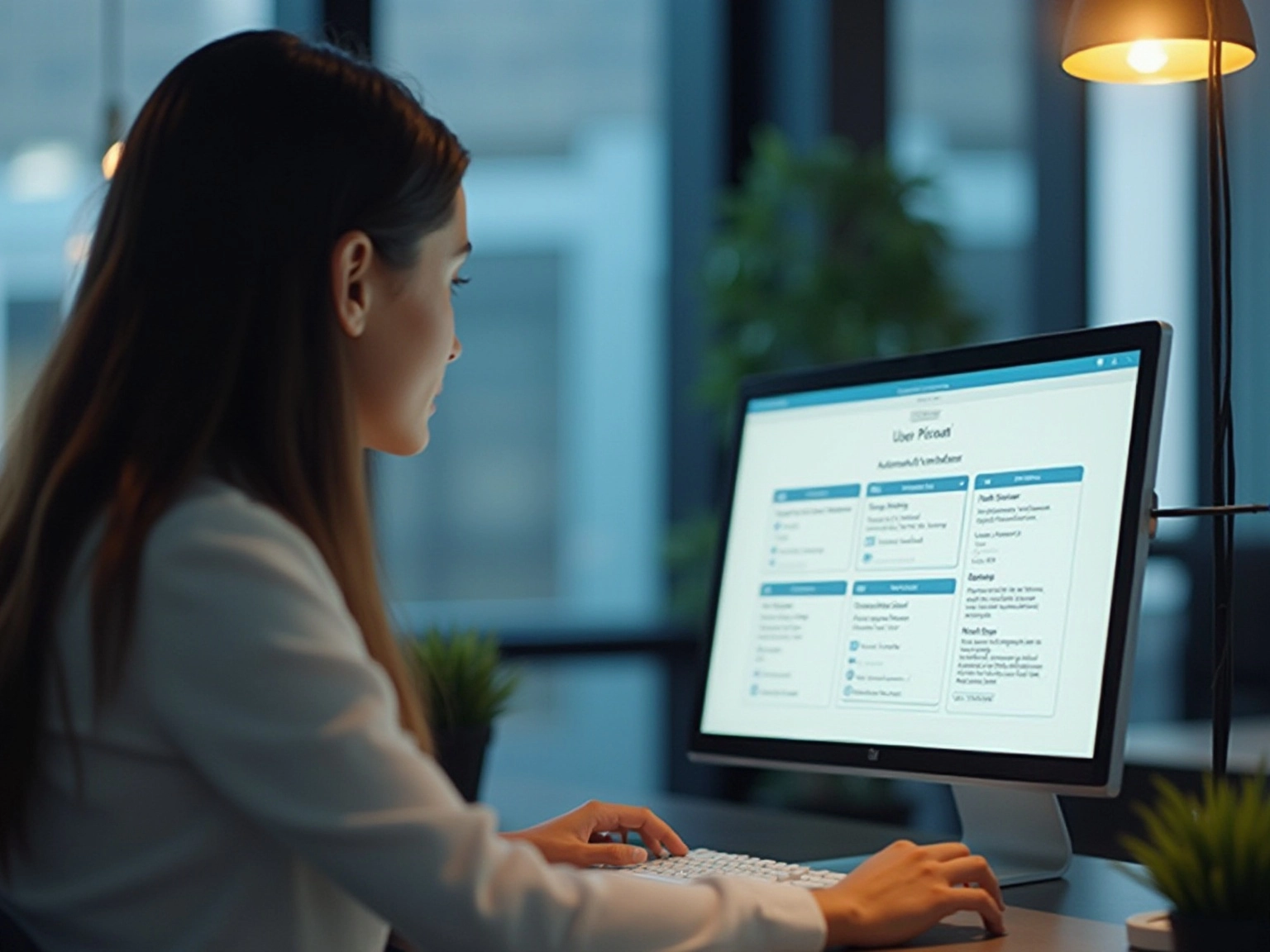Overview
Effective software management in accounting is crucial for enhancing operational efficiency and client engagement. By adopting cloud-based solutions and automating routine tasks, firms can significantly improve their performance. Tools like Glasscubes exemplify this approach, as they reduce paperwork and response times, enhance communication, and ultimately save firms substantial amounts of time. This positions them for success in a competitive market.
Accounting managers face numerous challenges, from managing vast amounts of paperwork to ensuring timely client communication. Glasscubes effectively addresses these issues, streamlining processes and fostering collaboration. By leveraging such tools, firms can not only improve their operational efficiency but also enhance client satisfaction.
In conclusion, the integration of advanced software solutions like Glasscubes is not merely an option but a necessity for accounting firms aiming to thrive. Embracing these technologies will empower firms to navigate the complexities of modern accounting, ensuring they remain competitive and responsive to client needs.
Key Highlights:
- Effective software management in accounting requires a strategic framework for selecting and maintaining financial solutions tailored to firm needs.
- Cloud-based financial software enhances real-time collaboration and data access, crucial for modern business operations.
- Automating accounts payable processes can reduce paperwork by 90-95% and improve efficiency by 20-27%.
- Glasscubes enhances client engagement through automated reminders and real-time progress tracking, significantly improving communication.
- Financial managers face challenges such as compliance with regulations and reliance on outdated systems, which hinder efficiency.
- Modern accounting tools should include features like automated invoicing, real-time reporting, and robust data security.
- Companies adopting automated systems report time savings, with users of Glasscubes documenting up to 288 hours saved in one tax season.
- Selecting the right accounting software involves defining specific needs, engaging stakeholders, and ensuring scalability for future growth.
- Successful case studies show that firms using software management tools like Glasscubes experience significant improvements in customer response rates and operational efficiency.
- Future trends in accounting software will be driven by AI, machine learning, and blockchain, enhancing automation and data accuracy.
Introduction
In the fast-paced realm of accounting, effective software management has emerged as a critical factor for success. As firms grapple with the complexities of compliance, data management, and client engagement, the selection and implementation of the right accounting software become essential. With the advent of cloud-based solutions and automation technologies, organizations can streamline operations, enhance efficiency, and ultimately concentrate on strategic growth.
This article explores the essential aspects of software management in accounting, examining the benefits, challenges, and best practices that will shape the future of the industry. From improving client communication to leveraging cutting-edge tools, comprehending these dynamics is vital for firms aspiring to thrive in a competitive landscape.
Understanding Software Management in Accounting
Effective management of applications in finance requires a strategic framework for selecting, implementing, and maintaining financial solutions that meet the specific needs of a firm. This process demands a comprehensive understanding of the functionalities offered by various applications, ensuring alignment with operational requirements. By adeptly managing software, accountants can automate routine tasks, minimize errors, and significantly enhance overall efficiency.
The transition to cloud-based financial software has become increasingly vital, facilitating real-time collaboration and data access—essential elements in today’s dynamic business landscape. Statistics reveal that automating accounts payable processes can reduce paperwork by 90-95% and boost efficiency by 20-27%. This transformation not only streamlines operations but also allows organisations to focus on strategic growth rather than routine administrative tasks.
Glasscubes exemplifies this by providing a platform that enhances customer engagement through efficient information gathering, automated reminders, and real-time progress tracking, further supporting automation and efficiency in financial practices.
A notable case study illustrates the evolution of accounts payable and receivable processes, which have shifted from manual invoice management to becoming key drivers of business growth. In the United Kingdom, the volume of invoices is on the rise, with companies embracing automation reporting savings of £16 or more per invoice. This shift underscores the importance of selecting the right financial technology, as organisations increasingly prioritise features like workflow automation, email automation, and automated customer reminders to enhance efficiency.
Glasscubes aligns with these priorities by offering a user-friendly platform that significantly reduces the time financial professionals spend pursuing clients for information, thereby enhancing client engagement and cutting response times by 50%. Current trends in software management tools for finance in 2025 highlight the necessity of integrating cloud-first solutions, exemplified by partnerships like Silverfin with MYOB, which tackle challenges in data handling and compliance. As companies navigate these changes, expert insights emphasise the importance of selecting financial tools that not only address immediate needs but also promote long-term growth and flexibility.
Significantly, 30% of companies are actively pursuing diversification of their workforce, reflecting the evolving landscape of financial practices and the demand for adaptable software solutions.
In conclusion, efficient software management for accountants in 2025 should prioritise automation, seamless integrations, and a culture of continuous improvement. By adopting these best practices, including utilising platforms like Glasscubes, businesses can enhance their operational efficiency and client engagement, ultimately positioning themselves for success in a competitive environment.

Challenges Faced by Accounting Managers
In 2025, financial managers face a myriad of challenges that significantly impact their efficiency and overall job satisfaction. Compliance with rapidly evolving regulations, managing extensive data volumes, and ensuring timely reporting are just a few hurdles they encounter. The pressure to maintain accuracy while adhering to tight deadlines often results in heightened stress and burnout among professionals in the field.
Importantly, 40% of new employees are drawn to companies due to their reputation, underscoring the significance of a supportive work atmosphere.
A major factor contributing to these challenges is the reliance on outdated financial systems, which greatly impede efficiency and collaboration in software management. These legacy systems often lead to cumbersome processes that consume valuable time and resources. For instance, companies utilising robotic process automation have reported a remarkable 44% improvement in efficiency, showcasing the potential benefits of modernising their operations.
Furthermore, users like Sophie Montgomery from TaxAssist Accountants have reported saving an impressive 288 hours in just one tax season by adopting modern technological solutions, illustrating the tangible time savings available.
Moreover, the increasing complexity of compliance requirements adds another layer of difficulty for accounting managers. Expert insights indicate that companies must prioritise robust compliance strategies to navigate these challenges effectively. Case studies reveal that organisations implementing comprehensive technological solutions, such as Glasscubes, not only enhance software management by alleviating the burdens of manual data entry and analysis but also empower managers to focus on strategic decision-making.
Glasscubes enhances client engagement through features like automated reminders, allowing firms to send up to 10 reminders on a simple schedule or an unlimited number of customised reminders, significantly improving communication with clients and ensuring deadlines are met. Additionally, the platform’s user-friendly onboarding experience means no training is required, and personalised setup assistance is provided, making it easy for teams to adapt quickly. Glasscubes also offers outstanding customer support, guaranteeing that users receive the assistance they require.
As the field of finance continues to evolve, it becomes crucial to tackle these challenges with innovative software management solutions like Glasscubes. By embracing technology, financial managers can enhance their workflows, reduce stress, and ultimately foster a more productive and satisfying work environment. Glasscubes operates on a subscription model with a 30-day free trial, allowing firms to explore its features and determine if it’s a good fit before committing.
Key Features of Effective Accounting Software
Effective accounting tools in 2025 must encompass a range of critical features, including automated invoicing, real-time financial reporting, and robust data security measures. Integration capabilities with other business tools, such as CRM systems, are essential for enhancing workflow efficiency and ensuring seamless operations across departments. A user-friendly interface is paramount, as it significantly reduces the learning curve for staff, leading to improved adoption rates and overall productivity.
For instance, software that provides customisable dashboards allows accountants to tailor their view of key metrics, facilitating quicker and more informed decision-making.
Moreover, mobile access has become progressively essential, enabling accountants to operate remotely and sustain productivity in today’s adaptable work setting.
Statistics indicate that companies utilising platforms like Glasscubes have witnessed a 50% decrease in response times and a 40% increase in customer interaction, highlighting the efficiency of automated features in optimising processes. Glasscubes enhances user engagement through organised communication, eliminating the confusion of endless email threads and ensuring that all interactions are neatly archived and accessible. Sophie Montgomery from TaxAssist Accountants observed that her firm reported an impressive 288 hours saved in just one tax season, underscoring the tangible benefits of using such tools.
Furthermore, the visibility into audit processes provided by Glasscubes allows both teams and clients to track progress in real-time, making the process less stressful and more efficient. This visibility is crucial for maintaining transparency and accountability throughout the audit process. By substituting manual, labour-intensive pursuits with intelligent automated notifications, Glasscubes guarantees prompt data submission, maintaining seamless and timely workflows.
In this evolving environment, the significance of user-friendly financial tools cannot be overstated. As the profession faces a significant talent shortage, with a 17% decline in accountants since 2020, organisations must prioritise tools that not only enhance operational efficiency but also attract and retain skilled professionals. By adopting digital solutions such as Glasscubes that provide user-friendly interfaces and automated features, including a dedicated information request tool for auditing, businesses can improve their software management and position themselves for success in a competitive market.
Benefits of Implementing Software Management Tools
Harnessing software management can deliver substantial advantages for accounting firms, including enhanced efficiency, reduced operational costs, and elevated customer satisfaction. For instance, organisations utilising automated systems for customer communication and data collection have reported impressive time savings. Users of Glasscubes have documented savings of up to 288 hours in a single tax season, underscoring the platform’s capability in optimising processes.
Moreover, the integration of automated systems accelerates communication and enhances data accuracy and compliance, significantly mitigating the risk of human error. This transition empowers accountants to concentrate on higher-value activities, such as strategic planning and advisory services, thereby enriching the overall service portfolio.
Real-world examples further highlight these advantages. One audit manager remarked that Glasscubes has proven indispensable throughout the audit process, facilitating seamless requests for information from year to year. The platform’s transparency enables users to track outstanding information, minimising the necessity for constant follow-ups.
This shift has resulted in quicker uploads from users compared to traditional email methods, offering significant benefits to the audit team. The audit manager also praised the support received from Glasscubes during the setup phase, noting that the team was consistently responsive to inquiries, which greatly eased the transition.
Companies that have embraced management tools have experienced a 50% reduction in response times, enabling them to engage with customers more effectively and efficiently. As highlighted by industry insights, technology is pivotal in boosting employee engagement and morale, with 60% of large organisations attributing these enhancements to technological advancements—crucial factors for retention in the competitive accounting sector.
In 2025, the advantages of implementing these tools are more pronounced than ever, with numerous companies acknowledging that the initial investment in software management can yield long-term benefits in productivity and customer satisfaction. While initial costs and setup time may present challenges, particularly for smaller firms, the advantages of automating routine tasks and centralising client interactions vastly outweigh these concerns. Furthermore, Glasscubes offers a subscription-based model with a 30-day free trial, allowing companies to evaluate its suitability without immediate financial commitment.
By cultivating a more organised workflow, financial firms can strategically position themselves for success in an increasingly digital landscape.

Enhancing Client Communication and Information Gathering
Effective communication with customers is paramount for thriving accounting practices in 2025. Software management solutions, particularly those featuring user portals, are revolutionising the information-gathering process by enabling users to securely submit documents and respond to requests. Key functionalities, such as automated reminders—where Glasscubes allows accountants to send up to 10 reminders on a simple schedule or an unlimited number with advanced options—along with real-time status updates, significantly enhance user engagement.
Accountants have the ability to tailor messages for each reminder, clearly indicating urgency for upcoming deadlines, thus ensuring they receive necessary information without delay.
For instance, Glasscubes empowers accountants to monitor responses and automate follow-ups, minimising the time spent on manual reminders. This approach not only boosts operational efficiency but also enriches the overall customer experience, fostering stronger relationships.
Statistics reveal that firms utilising portals experience a 40% increase in customer response rates and a 50% reduction in response times. These enhancements are crucial as the global financial application market is projected to reach $11.8 billion in the next eight years, underscoring the growing demand for efficient communication tools that can facilitate this expansion. Case studies, such as that of TaxAssist Accountants, illustrate the tangible benefits of adopting such platforms, with users like Sophie Montgomery reporting an impressive 288 hours saved in a single tax season.
Best practices for enhancing customer communication in software management for financial applications involve leveraging technology to offer transparency and real-time visibility into request statuses. This not only streamlines workflows but also cultivates customer loyalty; 94% of consumers prefer brands that are transparent about their operations, a fact that holds particular significance for businesses utilising Glasscubes. By incorporating user-friendly customer portals and customisable automated reminders, financial organisations can significantly enhance their information-gathering processes, ensuring they remain competitive in a rapidly evolving market.

Best Practices for Selecting Accounting Software
Selecting the right accounting system is crucial for businesses aiming to enhance efficiency through superior software management and foster client engagement. To commence, it is vital to define the specific needs of the organisation, considering compliance requirements and desired features. This foundational step in software management guarantees that the application aligns with the organisation’s operational objectives.
Engaging key stakeholders in the selection process is another best practice that cannot be overlooked. Involving team members from various departments not only cultivates buy-in but also ensures that the chosen solution meets the diverse needs of all users. Research shows that 30% of firms are actively seeking to diversify their workforce, while 40% of new hires prioritise companies based on their reputation. This underscores the importance of a collaborative approach in system selection.
Conducting thorough research on available software management options is essential. Organisations should read reviews and analyse case studies from similar entities to gain insights into the effectiveness of different software management solutions. For instance, before adopting Glasscubes, many organisations struggled with email communication, where information requests often led to lengthy email chains, resulting in lost information and duplicated requests.
This inefficiency highlighted the necessity for a more streamlined approach to client engagement and software management. Glasscubes offers features such as automated reminders, secure file sharing, and real-time reporting, directly addressing these software management challenges. A recent case study demonstrated that companies embracing automated solutions like Glasscubes significantly enhanced their software management and operational efficiency. Notably, automating an Accounts Payable process can reduce paperwork by 90-95% and boost efficiency by 20-27%, emphasising the importance of effective software management in realising tangible benefits from adopting these technologies.
Moreover, the experience of users like Sophie Montgomery from TaxAssist Accountants, who reported saving an impressive 288 hours in just one tax season, exemplifies the real-world advantages of efficient accounting software. Pricing for Glasscubes is structured to accommodate various needs, with plans starting at £120 per month for essential features, scaling up to £360 for more advanced options. Scalability is another critical consideration in software management. As companies evolve, their application requirements may change, making it imperative to select a solution with robust software management that can grow alongside the organisation.
Furthermore, prioritising suppliers that offer strong customer support and extensive training materials can facilitate a smoother implementation process, ensuring that teams can maximise the programme’s potential from the outset.
By adhering to these best practices in software management, companies can make informed decisions that lead to successful adoption, ultimately enhancing their operational efficiency and customer satisfaction. With the global financial management tools market projected to reach $11.8 billion in the next eight years, the right choice can position companies for sustained growth and competitiveness in the industry.
Case Studies: Success Stories in Software Management
Numerous accounting companies have successfully harnessed software management, leading to substantial enhancements in both efficiency and customer satisfaction. For instance, a mid-sized firm that integrated Glasscubes into its operations witnessed an impressive 40% increase in customer response rates alongside a 50% reduction in response times. This transformation not only streamlined communication but also cultivated a more responsive relationship with clients.
As emphasized by Steve, an audit manager at MGI, the transition to Glasscubes revolutionised their audit process. Previously, the company depended on lengthy email exchanges, often resulting in lost information and duplicated requests. With Glasscubes, clients engage more effectively, swiftly uploading information and accessing a transparent overview of outstanding requests.
This evolution has led to quicker responses and a more organised workflow, significantly enhancing the audit team’s efficiency.
In another example, an organisation that adopted automated reporting tools achieved a 30% reduction in time spent on monthly financial reporting. Such advancements underscore the transformative potential of effective software management, illustrating how technology can revolutionise traditional accounting practices.
Moreover, as the global accounting services sector is projected to expand from $652.32 billion in 2023 to $676.73 billion in 2024, with a compound annual growth rate (CAGR) of 3.7%, the imperative for organisations to embrace innovative solutions becomes increasingly evident. This growth is accompanied by a trend where 30% of companies actively seek to diversify their workforce, highlighting the evolving challenges within the industry. The integration of AI and automation is also on the rise, with 20% of accountants currently utilising AI and another 20% planning to adopt it soon, driven by the demand for efficiency in finance and accounting.
These success stories present a compelling incentive for other companies to adopt technology, not only to enhance their operational capabilities but also to improve client engagement and satisfaction. By leveraging tools like Glasscubes, financial organisations can position themselves at the forefront of this digital transformation, ensuring they remain competitive in an evolving industry.
Future Trends in Accounting Software Management
The future of financial management tools is set to undergo remarkable transformations, primarily driven by advancements in emerging technologies such as artificial intelligence (AI), machine learning, and blockchain. These innovations are not mere enhancements; they signify a paradigm shift that will greatly enhance automation capabilities, allowing firms to streamline processes and improve data accuracy. For instance, AI and machine learning are increasingly being integrated into accounting software, facilitating predictive analytics that can forecast financial trends and automate routine tasks. This automation liberates valuable time for accountants to concentrate on strategic decision-making.
As Petra Martinis states, “Generative AI is poised to play a major role in transforming how finance teams in large enterprises operate.”
Moreover, the rise of cloud-based solutions, such as Glasscubes, is reshaping the landscape of remote work and collaboration. Glasscubes enhances communication and streamlines information gathering, enabling accountants to access critical information from virtually anywhere while promoting real-time interaction with customers and team members. This flexibility is essential as customer expectations evolve, demanding not only compliance with regulations but also an enriched overall experience.
Glasscubes effectively addresses specific limitations of email communication, such as the lack of visibility regarding whether emails have received responses and the risk of misplaced queries. With features like automated reminders and real-time progress tracking, organisations utilising Glasscubes are better equipped to meet these expectations, ultimately enhancing customer satisfaction and loyalty.
Additionally, Glasscubes ensures security through features such as GDPR compliance and encryption, providing reassurance for both companies and customers.
As highlighted in recent case studies, accountants are increasingly assuming advisory roles, particularly in areas such as climate responsibility and sustainability practices. By incorporating environmental expenses into financial planning, companies can significantly enhance their value proposition to clients, demonstrating a commitment to both financial and environmental stewardship.
Looking ahead to 2025, the financial software management market is projected to reach a value of $11.8 billion, underscoring the vital need for businesses to adopt innovative solutions like Glasscubes that align with future trends. Compounding this urgency is the reported 17% decline in the number of accountants since 2020, highlighting a talent shortage that necessitates a focus on technology use and career development to attract and retain skilled professionals. By fostering a culture of innovation and embracing these emerging technologies, accounting managers can ensure their firms not only survive but thrive in this rapidly evolving landscape.

Conclusion
The exploration of software management in accounting underscores its pivotal role in shaping the industry’s future. As firms navigate the complexities of compliance, data management, and client engagement, selecting the right software becomes essential. Embracing cloud-based solutions and automation technologies streamlines operations and enhances overall efficiency, allowing accountants to focus on strategic growth rather than mundane tasks.
The challenges faced by accounting managers—such as outdated systems and evolving compliance requirements—highlight the urgent need for modern software solutions. By adopting platforms like Glasscubes, firms can alleviate burdens, improve communication, and foster a more productive work environment. The integration of effective software tools leads to substantial benefits, including increased client satisfaction, reduced response times, and enhanced operational efficiency.
As the accounting landscape continues to evolve, embracing best practices in software selection is crucial. Firms must prioritise user-friendly, scalable solutions that support long-term growth and adaptability. The success stories of organisations that have effectively utilised software management tools serve as compelling evidence of the transformative potential of technology in accounting.
Ultimately, the future of accounting software management is bright, driven by advancements in AI, machine learning, and cloud-based solutions. Firms that proactively embrace these innovations will not only enhance their operational capabilities but also position themselves as leaders in a competitive market. By focusing on effective software management, accounting firms can ensure they thrive in an ever-evolving landscape, delivering exceptional value to their clients and fostering sustainable growth.
